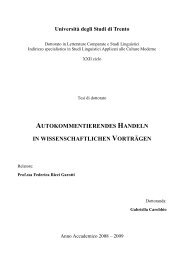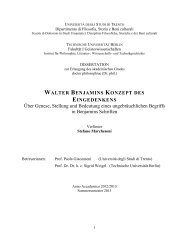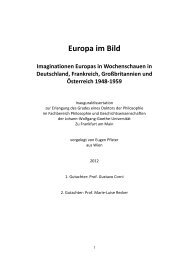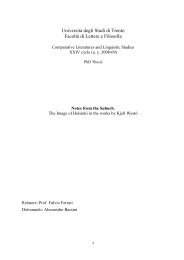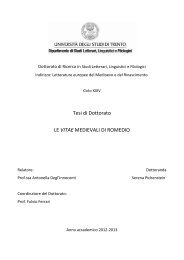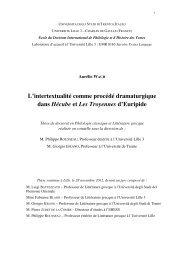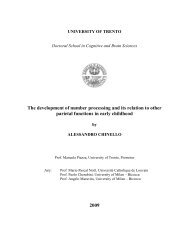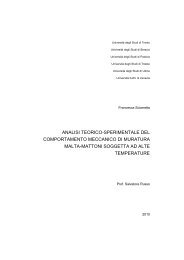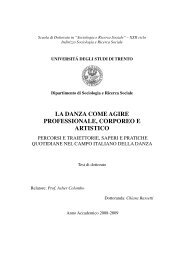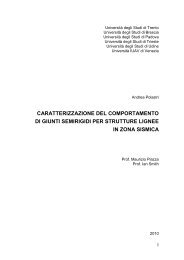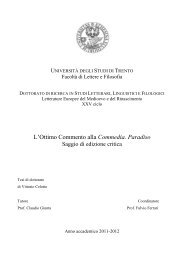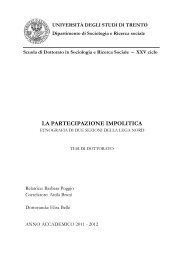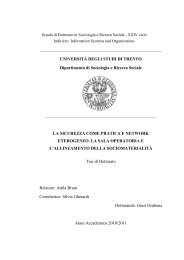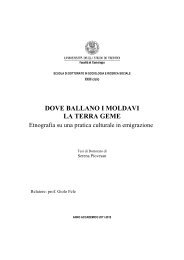- Page 1: Dottorato di Ricerca in Studi Lette
- Page 5 and 6: Introduzione, p. xi; Nota metodolog
- Page 7 and 8: 5.2.3 - La coppia strofica a, vv. 1
- Page 9 and 10: 8 - THOMAS STANLEY E L’EMENDATIO
- Page 11 and 12: Introduzione INTRODUZIONE L’edizi
- Page 13 and 14: Introduzione Cinquecento e nei prim
- Page 15 and 16: Introduzione mettere in luce se non
- Page 17 and 18: Introduzione posteriori di un secol
- Page 19 and 20: Introduzione Stanley e custodito ad
- Page 21 and 22: 1 - Il contesto storico e culturale
- Page 23 and 24: 1 - Il contesto storico e culturale
- Page 25 and 26: 1 - Il contesto storico e culturale
- Page 27 and 28: 1 - Il contesto storico e culturale
- Page 29 and 30: 1 - Il contesto storico e culturale
- Page 31 and 32: 1 - Il contesto storico e culturale
- Page 33 and 34: 1 - Il contesto storico e culturale
- Page 35 and 36: 1 - Il contesto storico e culturale
- Page 37 and 38: 1 - Il contesto storico e culturale
- Page 39: 1 - Il contesto storico e culturale
- Page 43 and 44: 1 - Il contesto storico e culturale
- Page 45 and 46: 1 - Il contesto storico e culturale
- Page 47 and 48: 1 - Il contesto storico e culturale
- Page 49 and 50: 1 - Il contesto storico e culturale
- Page 51 and 52: 1.3.1 - Enciclopedismo 1 - Il conte
- Page 53 and 54: 1 - Il contesto storico e culturale
- Page 55 and 56: 1 - Il contesto storico e culturale
- Page 57 and 58: 1 - Il contesto storico e culturale
- Page 59 and 60: 1 - Il contesto storico e culturale
- Page 61 and 62: 1 - Il contesto storico e culturale
- Page 63 and 64: 1 - Il contesto storico e culturale
- Page 65 and 66: 1 - Il contesto storico e culturale
- Page 67 and 68: 1 - Il contesto storico e culturale
- Page 69 and 70: 1 - Il contesto storico e culturale
- Page 71 and 72: 1 - Il contesto storico e culturale
- Page 73 and 74: 1 - Il contesto storico e culturale
- Page 75 and 76: 1 - Il contesto storico e culturale
- Page 77 and 78: 1 - Il contesto storico e culturale
- Page 79 and 80: 1 - Il contesto storico e culturale
- Page 81 and 82: 1 - Il contesto storico e culturale
- Page 83 and 84: 1 - Il contesto storico e culturale
- Page 85 and 86: 1 - Il contesto storico e culturale
- Page 87 and 88: 1 - Il contesto storico e culturale
- Page 89 and 90: 1 - Il contesto storico e culturale
- Page 91 and 92:
1 - Il contesto storico e culturale
- Page 93 and 94:
2 - Thomas Stanley: nota biografica
- Page 95 and 96:
2 - Thomas Stanley: nota biografica
- Page 97 and 98:
2 - Thomas Stanley: nota biografica
- Page 99 and 100:
2 - Thomas Stanley: nota biografica
- Page 101 and 102:
2 - Thomas Stanley: nota biografica
- Page 103 and 104:
2 - Thomas Stanley: nota biografica
- Page 105 and 106:
2 - Thomas Stanley: nota biografica
- Page 107 and 108:
2 - Thomas Stanley: nota biografica
- Page 109 and 110:
2.2.2 - Psalterium Carolinum 2 - Th
- Page 111 and 112:
2 - Thomas Stanley: nota biografica
- Page 113 and 114:
2 - Thomas Stanley: nota biografica
- Page 115 and 116:
2 - Thomas Stanley: nota biografica
- Page 117 and 118:
2 - Thomas Stanley: nota biografica
- Page 119 and 120:
2 - Thomas Stanley: nota biografica
- Page 121 and 122:
2 - Thomas Stanley: nota biografica
- Page 123 and 124:
2 - Thomas Stanley: nota biografica
- Page 125 and 126:
2 - Thomas Stanley: nota biografica
- Page 127 and 128:
2 - Thomas Stanley: nota biografica
- Page 129 and 130:
3 - Edizione a stampa e note manosc
- Page 131 and 132:
3 - Edizione a stampa e note manosc
- Page 133 and 134:
3 - Edizione a stampa e note manosc
- Page 135 and 136:
3 - Edizione a stampa e note manosc
- Page 137 and 138:
3 - Edizione a stampa e note manosc
- Page 139 and 140:
3 - Edizione a stampa e note manosc
- Page 141 and 142:
3 - Edizione a stampa e note manosc
- Page 143 and 144:
3 - Edizione a stampa e note manosc
- Page 145 and 146:
3 - Edizione a stampa e note manosc
- Page 147 and 148:
3 - Edizione a stampa e note manosc
- Page 149 and 150:
3 - Edizione a stampa e note manosc
- Page 151 and 152:
3 - Edizione a stampa e note manosc
- Page 153 and 154:
3 - Edizione a stampa e note manosc
- Page 155 and 156:
3 - Edizione a stampa e note manosc
- Page 157 and 158:
4 - Le fonti di Thomas Stanley 4 -
- Page 159 and 160:
4 - Le fonti di Thomas Stanley di a
- Page 161 and 162:
4 - Le fonti di Thomas Stanley Lach
- Page 163 and 164:
4 - Le fonti di Thomas Stanley poss
- Page 165 and 166:
4 - Le fonti di Thomas Stanley Casa
- Page 167 and 168:
4 - Le fonti di Thomas Stanley cont
- Page 169 and 170:
4 - Le fonti di Thomas Stanley raro
- Page 171 and 172:
4 - Le fonti di Thomas Stanley Tra
- Page 173 and 174:
4 - Le fonti di Thomas Stanley Le o
- Page 175 and 176:
4 - Le fonti di Thomas Stanley port
- Page 177 and 178:
4 - Le fonti di Thomas Stanley Frae
- Page 179 and 180:
Lect 1614 At illa crocicolorem in c
- Page 181 and 182:
4 - Le fonti di Thomas Stanley Seco
- Page 183 and 184:
4 - Le fonti di Thomas Stanley I br
- Page 185 and 186:
4 - Le fonti di Thomas Stanley anno
- Page 187 and 188:
4 - Le fonti di Thomas Stanley 4.3.
- Page 189 and 190:
4 - Le fonti di Thomas Stanley In e
- Page 191 and 192:
4 - Le fonti di Thomas Stanley In E
- Page 193 and 194:
4 - Le fonti di Thomas Stanley Le a
- Page 195 and 196:
4 - Le fonti di Thomas Stanley Conf
- Page 197 and 198:
4 - Le fonti di Thomas Stanley il p
- Page 199 and 200:
4 - Le fonti di Thomas Stanley Lo S
- Page 201 and 202:
5.1 - L’Agamennone di Eschilo: il
- Page 203 and 204:
5.1 - L’Agamennone di Eschilo: il
- Page 205 and 206:
5.1 - L’Agamennone di Eschilo: il
- Page 207 and 208:
5.1 - L’Agamennone di Eschilo: il
- Page 209 and 210:
5.1 - L’Agamennone di Eschilo: il
- Page 211 and 212:
5.1 - L’Agamennone di Eschilo: il
- Page 213 and 214:
5.1 - L’Agamennone di Eschilo: il
- Page 215 and 216:
5.1 - L’Agamennone di Eschilo: il
- Page 217 and 218:
5.1 - L’Agamennone di Eschilo: il
- Page 219 and 220:
5.2 - Parodo, Ag. 40-257 5.2.1 - La
- Page 221 and 222:
5.2 - L’Agamennone di Eschilo: la
- Page 223 and 224:
5.2 - L’Agamennone di Eschilo: la
- Page 225 and 226:
5.2 - L’Agamennone di Eschilo: la
- Page 227 and 228:
5.2 - L’Agamennone di Eschilo: la
- Page 229 and 230:
5.2 - L’Agamennone di Eschilo: la
- Page 231 and 232:
5.2 - L’Agamennone di Eschilo: la
- Page 233 and 234:
5.2 - L’Agamennone di Eschilo: la
- Page 235 and 236:
5.2 - L’Agamennone di Eschilo: la
- Page 237 and 238:
5.2 - L’Agamennone di Eschilo: la
- Page 239 and 240:
5.2 - L’Agamennone di Eschilo: la
- Page 241 and 242:
5.2 - L’Agamennone di Eschilo: la
- Page 243 and 244:
5.2 - L’Agamennone di Eschilo: la
- Page 245 and 246:
5.2 - L’Agamennone di Eschilo: la
- Page 247 and 248:
5.2 - L’Agamennone di Eschilo: la
- Page 249 and 250:
5.2 - L’Agamennone di Eschilo: la
- Page 251 and 252:
tovsson per eu[frwn aJ kala; drovso
- Page 253 and 254:
5.2 - L’Agamennone di Eschilo: la
- Page 255 and 256:
ijhvϊon de; kalevw Paia`na, mhv ti
- Page 257 and 258:
5.2 - L’Agamennone di Eschilo: la
- Page 259 and 260:
5.2 - L’Agamennone di Eschilo: la
- Page 261 and 262:
5.2 - L’Agamennone di Eschilo: la
- Page 263 and 264:
5.2 - L’Agamennone di Eschilo: la
- Page 265 and 266:
5.2 - L’Agamennone di Eschilo: la
- Page 267 and 268:
5.2 - L’Agamennone di Eschilo: la
- Page 269 and 270:
5.2 - L’Agamennone di Eschilo: la
- Page 271 and 272:
5.2 - L’Agamennone di Eschilo: la
- Page 273 and 274:
5.2 - L’Agamennone di Eschilo: la
- Page 275 and 276:
per vim frenique mutum robur. 5.2 -
- Page 277 and 278:
5.2 - L’Agamennone di Eschilo: la
- Page 279 and 280:
xunanuvtei bivou duvnto~ aujgai`~ 5
- Page 281 and 282:
5.2 - L’Agamennone di Eschilo: la
- Page 283 and 284:
5.2 - L’Agamennone di Eschilo: la
- Page 285 and 286:
5.2 - L’Agamennone di Eschilo: la
- Page 287 and 288:
5.3 - Primo episodio; Ag. 258-354.
- Page 289 and 290:
5.3 - L’Agamennone di Eschilo: il
- Page 291 and 292:
5.3 - L’Agamennone di Eschilo: il
- Page 293 and 294:
5.3 - L’Agamennone di Eschilo: il
- Page 295 and 296:
5.3 - L’Agamennone di Eschilo: il
- Page 297 and 298:
5.3 - L’Agamennone di Eschilo: il
- Page 299 and 300:
5.3 - L’Agamennone di Eschilo: il
- Page 301 and 302:
5.3 - L’Agamennone di Eschilo: il
- Page 303 and 304:
5.3 - L’Agamennone di Eschilo: il
- Page 305 and 306:
5.3 - L’Agamennone di Eschilo: il
- Page 307 and 308:
5.3 - L’Agamennone di Eschilo: il
- Page 309 and 310:
5.3 - L’Agamennone di Eschilo: il
- Page 311 and 312:
5.3 - L’Agamennone di Eschilo: il
- Page 313 and 314:
5.3 - L’Agamennone di Eschilo: il
- Page 315 and 316:
5.3 - L’Agamennone di Eschilo: il
- Page 317 and 318:
5.3 - L’Agamennone di Eschilo: il
- Page 319 and 320:
5.3 - L’Agamennone di Eschilo: il
- Page 321 and 322:
5.3 - L’Agamennone di Eschilo: il
- Page 323 and 324:
5.3 - L’Agamennone di Eschilo: il
- Page 325 and 326:
vv. 338-40 (346-48 Stanley): 5.3 -
- Page 327 and 328:
5.3 - L’Agamennone di Eschilo: il
- Page 329 and 330:
5.3 - L’Agamennone di Eschilo: il
- Page 331 and 332:
5.4 - L’Agamennone di Eschilo: il
- Page 333 and 334:
5.4 - L’Agamennone di Eschilo: il
- Page 335 and 336:
5.4 - L’Agamennone di Eschilo: il
- Page 337 and 338:
vv. 361-66 (370-74 Stanley) 5.4 - L
- Page 339 and 340:
5.4.2 - Coppia strofica a, Ag. 366-
- Page 341 and 342:
5.4 - L’Agamennone di Eschilo: il
- Page 343 and 344:
5.4 - L’Agamennone di Eschilo: il
- Page 345 and 346:
vv. 376-79 (385-88 Stanley): 5.4 -
- Page 347 and 348:
5.4 - L’Agamennone di Eschilo: il
- Page 349 and 350:
5.4 - L’Agamennone di Eschilo: il
- Page 351 and 352:
5.4 - L’Agamennone di Eschilo: il
- Page 353 and 354:
5.4 - L’Agamennone di Eschilo: il
- Page 355 and 356:
5.4 - L’Agamennone di Eschilo: il
- Page 357 and 358:
5.4 - L’Agamennone di Eschilo: il
- Page 359 and 360:
5.4 - L’Agamennone di Eschilo: il
- Page 361 and 362:
5.4 - L’Agamennone di Eschilo: il
- Page 363 and 364:
5.4 - L’Agamennone di Eschilo: il
- Page 365 and 366:
5.4 - L’Agamennone di Eschilo: il
- Page 367 and 368:
5.4 - L’Agamennone di Eschilo: il
- Page 369 and 370:
5.4 - L’Agamennone di Eschilo: il
- Page 371 and 372:
5.4 - L’Agamennone di Eschilo: il
- Page 373 and 374:
vv. 420-26 (430-36 Stanley): 5.4 -
- Page 375 and 376:
5.4 - L’Agamennone di Eschilo: il
- Page 377 and 378:
5.4 - L’Agamennone di Eschilo: il
- Page 379 and 380:
5.4 - L’Agamennone di Eschilo: il
- Page 381 and 382:
5.4 - L’Agamennone di Eschilo: il
- Page 383 and 384:
5.4 - L’Agamennone di Eschilo: il
- Page 385 and 386:
5.4 - L’Agamennone di Eschilo: il
- Page 387 and 388:
to; d’uJperkovtw~ kluvein eu\, ba
- Page 389 and 390:
5.4 - L’Agamennone di Eschilo: il
- Page 391 and 392:
cavrin xunainevsai. 5.4 - L’Agame
- Page 393 and 394:
5.4 - L’Agamennone di Eschilo: il
- Page 395 and 396:
5.4 - L’Agamennone di Eschilo: il
- Page 397 and 398:
5.5 - Secondo episodio; Ag. 488-680
- Page 399 and 400:
5.5 - L’Agamennone di Eschilo: il
- Page 401 and 402:
5.5 - L’Agamennone di Eschilo: il
- Page 403 and 404:
5.5 - L’Agamennone di Eschilo: il
- Page 405 and 406:
5.5 - L’Agamennone di Eschilo: il
- Page 407 and 408:
5.5 - L’Agamennone di Eschilo: il
- Page 409 and 410:
5.5 - L’Agamennone di Eschilo: il
- Page 411 and 412:
5.5 - L’Agamennone di Eschilo: il
- Page 413 and 414:
5.5 - L’Agamennone di Eschilo: il
- Page 415 and 416:
5.5 - L’Agamennone di Eschilo: il
- Page 417 and 418:
5.5 - L’Agamennone di Eschilo: il
- Page 419 and 420:
5.5 - L’Agamennone di Eschilo: il
- Page 421 and 422:
5.5 - L’Agamennone di Eschilo: il
- Page 423 and 424:
5.5 - L’Agamennone di Eschilo: il
- Page 425 and 426:
5.5 - L’Agamennone di Eschilo: il
- Page 427 and 428:
5.5 - L’Agamennone di Eschilo: il
- Page 429 and 430:
5.5 - L’Agamennone di Eschilo: il
- Page 431 and 432:
5.5 - L’Agamennone di Eschilo: il
- Page 433 and 434:
5.5 - L’Agamennone di Eschilo: il
- Page 435 and 436:
5.5 - L’Agamennone di Eschilo: il
- Page 437 and 438:
5.5 - L’Agamennone di Eschilo: il
- Page 439 and 440:
5.5 - L’Agamennone di Eschilo: il
- Page 441 and 442:
5.5 - L’Agamennone di Eschilo: il
- Page 443 and 444:
5.5 - L’Agamennone di Eschilo: il
- Page 445 and 446:
5.5 - L’Agamennone di Eschilo: il
- Page 447 and 448:
5.5 - L’Agamennone di Eschilo: il
- Page 449 and 450:
5.5 - L’Agamennone di Eschilo: il
- Page 451 and 452:
5.5 - L’Agamennone di Eschilo: il
- Page 453 and 454:
5.5 - L’Agamennone di Eschilo: il
- Page 455 and 456:
5.5 - L’Agamennone di Eschilo: il
- Page 457 and 458:
5.5 - L’Agamennone di Eschilo: il
- Page 459 and 460:
5.5 - L’Agamennone di Eschilo: il
- Page 461 and 462:
5.5 - L’Agamennone di Eschilo: il
- Page 463 and 464:
5.5 - L’Agamennone di Eschilo: il
- Page 465 and 466:
5.5 - L’Agamennone di Eschilo: il
- Page 467 and 468:
5.5 - L’Agamennone di Eschilo: il
- Page 469 and 470:
5.5 - L’Agamennone di Eschilo: il
- Page 471 and 472:
6 - La traduzione stanleiana 6 - LA
- Page 473 and 474:
6 - La traduzione stanleiana saprà
- Page 475 and 476:
6 - La traduzione stanleiana opere
- Page 477 and 478:
6 - La traduzione stanleiana Huet r
- Page 479 and 480:
6 - La traduzione stanleiana inespr
- Page 481 and 482:
6 - La traduzione stanleiana imposs
- Page 483 and 484:
6 - La traduzione stanleiana di Gio
- Page 485 and 486:
6 - La traduzione stanleiana retori
- Page 487 and 488:
6 - La traduzione stanleiana Va, ma
- Page 489 and 490:
6 - La traduzione stanleiana Stanle
- Page 491 and 492:
6 - La traduzione stanleiana corris
- Page 493 and 494:
6 - La traduzione stanleiana Innanz
- Page 495 and 496:
6 - La traduzione stanleiana prassi
- Page 497 and 498:
6 - La traduzione stanleiana pietra
- Page 499 and 500:
6 - La traduzione stanleiana compiu
- Page 501 and 502:
6 - La traduzione stanleiana come l
- Page 503 and 504:
6 - La traduzione stanleiana tutto
- Page 505 and 506:
6 - La traduzione stanleiana Radice
- Page 507 and 508:
6 - La traduzione stanleiana Da que
- Page 509 and 510:
6 - La traduzione stanleiana interp
- Page 511 and 512:
6 - La traduzione stanleiana Un ese
- Page 513 and 514:
6 - La traduzione stanleiana Le par
- Page 515 and 516:
6 - La traduzione stanleiana ‘exc
- Page 517 and 518:
6 - La traduzione stanleiana ‘mem
- Page 519 and 520:
6 - La traduzione stanleiana Al v.
- Page 521 and 522:
6 - La traduzione stanleiana 1832,
- Page 523 and 524:
6 - La traduzione stanleiana commen
- Page 525 and 526:
6 - La traduzione stanleiana comple
- Page 527 and 528:
6 - La traduzione stanleiana Un pro
- Page 529 and 530:
7 - Il commentario ad Eschilo di Th
- Page 531 and 532:
7 - Il commentario ad Eschilo di Th
- Page 533 and 534:
7 - Il commentario ad Eschilo di Th
- Page 535 and 536:
7 - Il commentario ad Eschilo di Th
- Page 537 and 538:
7 - Il commentario ad Eschilo di Th
- Page 539 and 540:
7 - Il commentario ad Eschilo di Th
- Page 541 and 542:
7 - Il commentario ad Eschilo di Th
- Page 543 and 544:
7 - Il commentario ad Eschilo di Th
- Page 545 and 546:
7 - Il commentario ad Eschilo di Th
- Page 547 and 548:
7 - Il commentario ad Eschilo di Th
- Page 549 and 550:
7 - Il commentario ad Eschilo di Th
- Page 551 and 552:
7 - Il commentario ad Eschilo di Th
- Page 553 and 554:
7 - Il commentario ad Eschilo di Th
- Page 555 and 556:
7 - Il commentario ad Eschilo di Th
- Page 557 and 558:
7 - Il commentario ad Eschilo di Th
- Page 559 and 560:
7.4 - Il pitagorismo di Eschilo 7 -
- Page 561 and 562:
7 - Il commentario ad Eschilo di Th
- Page 563 and 564:
7 - Il commentario ad Eschilo di Th
- Page 565 and 566:
7 - Il commentario ad Eschilo di Th
- Page 567 and 568:
7 - Il commentario ad Eschilo di Th
- Page 569 and 570:
7 - Il commentario ad Eschilo di Th
- Page 571 and 572:
7 - Il commentario ad Eschilo di Th
- Page 573 and 574:
7 - Il commentario ad Eschilo di Th
- Page 575 and 576:
7 - Il commentario ad Eschilo di Th
- Page 577 and 578:
7 - Il commentario ad Eschilo di Th
- Page 579 and 580:
7.4.4.4 - Fisiognomica 7 - Il comme
- Page 581 and 582:
7 - Il commentario ad Eschilo di Th
- Page 583 and 584:
7 - Il commentario ad Eschilo di Th
- Page 585 and 586:
7 - Il commentario ad Eschilo di Th
- Page 587 and 588:
7 - Il commentario ad Eschilo di Th
- Page 589 and 590:
7 - Il commentario ad Eschilo di Th
- Page 591 and 592:
7 - Il commentario ad Eschilo di Th
- Page 593 and 594:
7 - Il commentario ad Eschilo di Th
- Page 595 and 596:
7 - Il commentario ad Eschilo di Th
- Page 597 and 598:
7 - Il commentario ad Eschilo di Th
- Page 599 and 600:
7 - Il commentario ad Eschilo di Th
- Page 601 and 602:
7 - Il commentario ad Eschilo di Th
- Page 603 and 604:
7 - Il commentario ad Eschilo di Th
- Page 605 and 606:
7 - Il commentario ad Eschilo di Th
- Page 607 and 608:
7 - Il commentario ad Eschilo di Th
- Page 609 and 610:
7 - Il commentario ad Eschilo di Th
- Page 611 and 612:
7 - Il commentario ad Eschilo di Th
- Page 613 and 614:
7 - Il commentario ad Eschilo di Th
- Page 615 and 616:
7 - Il commentario ad Eschilo di Th
- Page 617 and 618:
7 - Il commentario ad Eschilo di Th
- Page 619 and 620:
7 - Il commentario ad Eschilo di Th
- Page 621 and 622:
7 - Il commentario ad Eschilo di Th
- Page 623 and 624:
7 - Il commentario ad Eschilo di Th
- Page 625 and 626:
7 - Il commentario ad Eschilo di Th
- Page 627 and 628:
7 - Il commentario ad Eschilo di Th
- Page 629 and 630:
7 - Il commentario ad Eschilo di Th
- Page 631 and 632:
7 - Il commentario ad Eschilo di Th
- Page 633 and 634:
7 - Il commentario ad Eschilo di Th
- Page 635 and 636:
7 - Il commentario ad Eschilo di Th
- Page 637 and 638:
8 - Thomas Stanley e l’emendatio
- Page 639 and 640:
8 - Thomas Stanley e l’emendatio
- Page 641 and 642:
8 - Thomas Stanley e l’emendatio
- Page 643 and 644:
8 - Thomas Stanley e l’emendatio
- Page 645 and 646:
8 - Thomas Stanley e l’emendatio
- Page 647 and 648:
8 - Thomas Stanley e l’emendatio
- Page 649 and 650:
8 - Thomas Stanley e l’emendatio
- Page 651 and 652:
8 - Thomas Stanley e l’emendatio
- Page 653 and 654:
8 - Thomas Stanley e l’emendatio
- Page 655 and 656:
8 - Thomas Stanley e l’emendatio
- Page 657 and 658:
8 - Thomas Stanley e l’emendatio
- Page 659 and 660:
8 - Thomas Stanley e l’emendatio
- Page 661 and 662:
8 - Thomas Stanley e l’emendatio
- Page 663 and 664:
8 - Thomas Stanley e l’emendatio
- Page 665 and 666:
8 - Thomas Stanley e l’emendatio
- Page 667 and 668:
8 - Thomas Stanley e l’emendatio
- Page 669 and 670:
8 - Thomas Stanley e l’emendatio
- Page 671 and 672:
8 - Thomas Stanley e l’emendatio
- Page 673 and 674:
8 - Thomas Stanley e l’emendatio
- Page 675 and 676:
8 - Thomas Stanley e l’emendatio
- Page 677 and 678:
8 - Thomas Stanley e l’emendatio
- Page 679 and 680:
8 - Thomas Stanley e l’emendatio
- Page 681 and 682:
8 - Thomas Stanley e l’emendatio
- Page 683 and 684:
8 - Thomas Stanley e l’emendatio
- Page 685 and 686:
8 - Thomas Stanley e l’emendatio
- Page 687 and 688:
8 - Thomas Stanley e l’emendatio
- Page 689 and 690:
8 - Thomas Stanley e l’emendatio
- Page 691 and 692:
9 - Metrica e responsione di un’e
- Page 693 and 694:
9 - Metrica e responsione di un’e
- Page 695 and 696:
9 - Metrica e responsione di un’e
- Page 697 and 698:
9 - Metrica e responsione di un’e
- Page 699 and 700:
9 - Metrica e responsione di un’e
- Page 701 and 702:
9 - Metrica e responsione di un’e
- Page 703 and 704:
9 - Metrica e responsione di un’e
- Page 705 and 706:
9 - Metrica e responsione di un’e
- Page 707 and 708:
stratou` to;n ajmfivzeukton 130 ejx
- Page 709 and 710:
9 - Metrica e responsione di un’e
- Page 711 and 712:
alh;n ajrcai`o~ balh;n i[qi, i[kou,
- Page 713 and 714:
9 - Metrica e responsione di un’e
- Page 715 and 716:
9 - Metrica e responsione di un’e
- Page 717 and 718:
ojligodranivan a[kikun, ijsovneiron
- Page 719 and 720:
9 - Metrica e responsione di un’e
- Page 721 and 722:
9 - Metrica e responsione di un’e
- Page 723 and 724:
9 - Metrica e responsione di un’e
- Page 725 and 726:
9 - Metrica e responsione di un’e
- Page 727 and 728:
9 - Metrica e responsione di un’e
- Page 729 and 730:
9 - Metrica e responsione di un’e
- Page 731 and 732:
9 - Metrica e responsione di un’e
- Page 733 and 734:
9 - Metrica e responsione di un’e
- Page 735 and 736:
9 - Metrica e responsione di un’e
- Page 737 and 738:
9 - Metrica e responsione di un’e
- Page 739 and 740:
9 - Metrica e responsione di un’e
- Page 741 and 742:
9 - Metrica e responsione di un’e
- Page 743 and 744:
9 - Metrica e responsione di un’e
- Page 745 and 746:
Coppia strofica a, vv. 366-84 ~ 385
- Page 747 and 748:
9 - Metrica e responsione di un’e
- Page 749 and 750:
9 - Metrica e responsione di un’e
- Page 751 and 752:
13 wlwllwl 14 lwllwlwll 15 llllwll
- Page 753 and 754:
9 - Metrica e responsione di un’e
- Page 755 and 756:
9 - Metrica e responsione di un’e
- Page 757 and 758:
9 - Metrica e responsione di un’e
- Page 759 and 760:
10.1 - Il grande divulgatore 10 - C
- Page 761 and 762:
10 - Conclusioni Di certo Stanley n
- Page 763 and 764:
10 - Conclusioni una diversa interp
- Page 765 and 766:
10 - Conclusioni Il commentario di
- Page 767 and 768:
10 - Conclusioni Fino all’edizion
- Page 769 and 770:
10 - Conclusioni Stanley manifesta
- Page 771 and 772:
10 - Conclusioni ma in alcuni casi
- Page 773 and 774:
10 - Conclusioni L’attenzione all
- Page 775 and 776:
10 - Conclusioni di persone, config
- Page 777 and 778:
11 - Appendici 11 - APPENDICI 11.1
- Page 779 and 780:
11 - Appendici VL 29 uJpoptuvsswn (
- Page 781 and 782:
11 - Appendici VL 185 ouj paravmuqo
- Page 783 and 784:
Ed. Ed./ S 11 - Appendici 428 [Atla
- Page 785 and 786:
11 - Appendici Au. VL ejk gh`~ (Rob
- Page 787 and 788:
11 - Appendici Au. 987 kaj/ti Rawl.
- Page 789 and 790:
11 - Appendici Au. 246 a[tan (Robor
- Page 791 and 792:
11 - Appendici paia`n (Robort.) Raw
- Page 793 and 794:
Au. 900 dihvkei dhv VL 901 Hm.] ste
- Page 795 and 796:
11 - Appendici VL/ 228 ejxilevoito
- Page 797 and 798:
11 - Appendici VL 959 Souvda~ (Robo
- Page 799 and 800:
11 - Appendici Ed. perivpepta (Hsch
- Page 801 and 802:
11 - Appendici Au. 198 e[peita dev
- Page 803 and 804:
Au. 286 {Ellh~ u{per te povnton 11
- Page 805 and 806:
11 - Appendici S 347 me;n tuvcoi (J
- Page 807 and 808:
S/ Au. S/ TL/ Ed. S/ Au. 11 - Appen
- Page 809 and 810:
Au. faidroi`~ iJdovnte~ o[mmasi 11
- Page 811 and 812:
11 - Appendici Au. (A); Dyce 113 (A
- Page 813 and 814:
TL/ Ed. TL/ Ed. 11 - Appendici 793
- Page 815 and 816:
11 - Appendici Ed. Leid. 756 D 22;
- Page 817 and 818:
S/ Au. 11 - Appendici 966 i{ket’a
- Page 819 and 820:
11 - Appendici S/ Au. 1046 o{moi te
- Page 821 and 822:
11 - Appendici VL 1159 Hic finiunt
- Page 823 and 824:
11 - Appendici Au. 1253 d’a[r Spa
- Page 825 and 826:
11 - Appendici S/ 1362 teivnonte~ (
- Page 827 and 828:
S/ Au. 11 - Appendici neivrh/ Rawl.
- Page 829 and 830:
Au. Au. moi ajllhlofovnou~ S/ 1579
- Page 831 and 832:
11 - Appendici Ed./ {touvsde} Leid.
- Page 833 and 834:
11 - Appendici S/ 26 d’wjgmoi`si
- Page 835 and 836:
11 - Appendici Ed. 117 Electrae tri
- Page 837 and 838:
11 - Appendici VL ajcrhmavtoisi (Ro
- Page 839 and 840:
11 - Appendici Au. 406 i[desqe Rawl
- Page 841 and 842:
S/ Au. TL/ Ed./ VL Ed./ VL S/ Au. 1
- Page 843 and 844:
S pedavwroi Au. 596 {kai;} gunaikw`
- Page 845 and 846:
11 - Appendici Au. 715 ejpeuquvnw R
- Page 847 and 848:
11 - Appendici 22; Leid. 756 D 23 E
- Page 849 and 850:
11 - Appendici D 22 S 889 ajndrodmh
- Page 851 and 852:
S metoikodovmo~ (Jac.) S/ TL/ Ed. 1
- Page 853 and 854:
11 - Appendici Au. 1066 pneuvsa~ (S
- Page 855 and 856:
11 - Appendici S/ Au. 226 plevw (Au
- Page 857 and 858:
11 - Appendici Au. ajpravktoisin Ra
- Page 859 and 860:
11 - Appendici S/ Ed. 470 h[ ti~ Ad
- Page 861 and 862:
11 - Appendici G.190 Dyce 113 (P);
- Page 863 and 864:
11 - Appendici VL/ 782 ijovn, ijovn
- Page 865 and 866:
11 - Appendici S 944 eujqhnou`nta R
- Page 867 and 868:
TL/ Ed./ VL 11 - Appendici 847 Dyce
- Page 869 and 870:
11 - Appendici Au. G.190 Dyce 113 (
- Page 871 and 872:
TL/ Ed. Ed. 316 versus deest S/ Au.
- Page 873 and 874:
11 - Appendici D 22 (A) Au. a[th~ g
- Page 875 and 876:
11 - Appendici Ed. Ed. dhmhlavthn T
- Page 877 and 878:
11 - Appendici Au. (dievla) (Scal.)
- Page 879 and 880:
11 - Appendici VL brevtei~ (Robort.
- Page 881 and 882:
11 - Appendici S naivonte~ Adv. b.3
- Page 883 and 884:
484 uJfavsmato~ (Ed.) 501 dh; povro
- Page 885 and 886:
970-1 ante 968-9 ponendi (S) 974 me
- Page 887 and 888:
278 dusfovrou~ (S) 285 oJrw`n to;n
- Page 889 and 890:
11.2.6 - Eumenidi 17 ejnqevou (TL;
- Page 891 and 892:
kajgno;~ eJsmov~ (S; Ed.) 228 oujde
- Page 893 and 894:
12 - Bibliografia 12 - BIBLIOGRAFIA
- Page 895 and 896:
12 - Bibliografia Wood 1813 A. Wood
- Page 897 and 898:
12 - Bibliografia Page 1972 Aeschyl
- Page 899 and 900:
12 - Bibliografia Calder 1922 W.M.
- Page 901 and 902:
12 - Bibliografia Rabel 1987 R.J. R
- Page 903 and 904:
12 - Bibliografia Hansen 2005 P.A.
- Page 905 and 906:
12 - Bibliografia Reynolds-Wilson 1
- Page 907 and 908:
12 - Bibliografia Delatour-Sarmant
- Page 909:
12 - Bibliografia Turnbull 1953 b G



